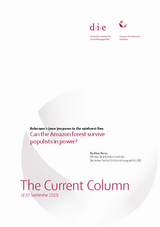The Current Column
Bolsonaro’s (non-)response to the rainforest fires
Can the Amazon forest survive populists in power?
Burni, AlineThe Current Column (2019)
Bonn: German Development Institute / Deutsches Institut für Entwicklungspolitik (DIE), (The Current Column of 30 September 2019)
Bonn, 30 September 2019. The fires burning in the Amazon endanger the earth’s climate, but are also inflaming global diplomatic tensions. Not so long ago, Brazil was regarded as one of the emerging economies reshaping the global scene. But with Jair Bolsonaro in charge, Brazil’s image drastically changed. Like other populist right-wing politicians, he affects long-lasting consequences on world politics, by undermining efforts to reach the global development goals. Nativism and anti-elitism characterise right-wing populism. In other words, right wing populists claim to protect their own nation-state from perceived external and internal threats: be they cultural, economic, or related to security. Right-wing populists claim to represent the “will of the people”, yet embrace an illiberal form of democracy that ultimately undermines it, by often bypassing institutional checks-and-balances, disrespecting the rule of law and minorities’ rights, as well as opposing intermediating channels. They promote an anti-globalist discourse that challenges basic assumptions of foreign policy, including development cooperation. They oppose multilateralism, and put their “own people’s” interest first. We see nations disengaging from global commitments, as in the Brazilian case. This threatens collective efforts to promote and preserve global common goods, and can be particularly damaging for countries and communities relying on assistance. Bolsonaro’s actions contribute to the destruction of the Amazon, considered pivotal in climate change mitigation because it is a major carbon sink, and due to its vital role in regional and climate regulation. He has cut several measures aimed at preventing deforestation, opening the way for environmental degradation. He fired the director of the agency responsible for deforestation monitoring, relaxed government inspections of landowners, and even accused NGOs of causing the fires. Similar to other populists like US President Donald Trump, Bolsonaro legitimises an anti-environmentalist, anti-science and nationalist rhetoric, which denies climate change, allows local farmers to overlook environmental sustainability, and even encourages violence against indigenous people. Against this backdrop, reactions to the Amazon fires by global leaders ended up fanning the flames of Bolsonaro’s nationalist and provocative rhetoric at home. For instance, no Brazilian representative was invited to join the Amazon discussions during the recent G7 meeting in France. This reinforces the view that rich countries hold a neo-colonial and interventionist approach, nurturing the Brazilian government’s argument that it needs to protect its sovereignty over the Amazon region. The fear of international envy regarding the riches of the Amazon is not new, but this time it has fuelled the belief in a conspiracy of rich countries trying to hinder Brazil’s economic development. On Brazil’s Independence Day, Bolsonaro appealed to his supporters to go to the streets wearing the flag’s colours so to “show that the Amazon belongs to Brazilians”. The importance of preserving the Amazon rainforest is self-evident in the eyes of the international community, as a home for indigenous peoples, as a carbon sink, and its importance for biodiversity conservation. However, conserving it is not straightforward, both from a national-sovereignty and from a sustainable development perspective. A large part of Brazilian society believes that exploiting the Amazon is vital for economic growth. Investment in the region is certainly important, especially to the local community which relies on natural resources to survive. Nevertheless, development should happen in a sustainable and inclusive manner, which remains a challenge. What is the way out? Domestically, the political opposition should unite around environmental protection and sustainable development. For now, however, the group of leftist parties, among which the Workers’ Party has the largest seat share in parliament, has been fragmented and lacks a credible project. Organised internal pressure should also come from civil society and courts, similar to the May 2019 protests in several Brazilian cities against the cuts of government spending on higher education. Internationally, countries like Austria, France and Ireland are threatening not to ratify the EU-Mercosur trade deal if the Amazon is endangered. This can force Bolsonaro to reconsider his actions towards environmental protection, since economic growth was a central promise. The government needs to control deforestation by enforcing the law, and to maintain protected areas. In addition, international cooperation should recognize and support local development initiatives that combine income generation and environmental preservation. An example is the project run by the indigenous association Kisêdjê, awarded the Equator Prize 2019, which uses native pequi tree to recover areas of forest once destroyed. For local communities, such practices also represent an alternative to employment in large-scale agricultural farms.

